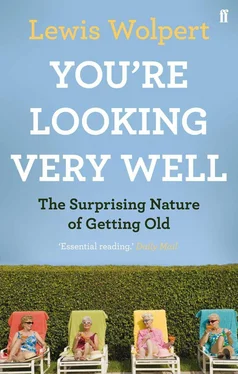Of those who reach 100, a study found that about one half avoided chronic disease till they were over 80, and about one fifth escaped all the main chronic diseases. Children of centenarians suffer less from cancer and heart disease. A variation in the gene FOXO3A, a key regulator of the insulin-IGF1 signalling pathway, has a positive effect on the life expectancy of humans, and is found much more often in people living to a hundred and beyond—this appears to be true worldwide. The ApoE gene can also help with respect to dementia. Failing to give up smoking or to control blood pressure and cholesterol were reported to reduce life expectancy by 10 to 15 years. However, Clement Freud commented: ‘If you resolve to give up smoking, drinking and loving, you don’t actually live any longer, it just seems longer.’
Studies of twins and long-lived families have indicated that genes can explain about one third of maximum lifespan, but even identical twins age differently and this may be partly due to random switching on and off of some of their genes due to environmental influences. The other determinants are how one lives and chance factors like accidents and infections. Siblings of centenarians have a significantly higher chance of becoming a centenarian themselves. We have seen that the insulin IGF-1 system is involved in determining lifespan in model organism, so could reduction in its activity increase lifespan in humans? The answer seems to be yes. Mutations known to impair IGF-1 receptor function are overrepresented in a cohort of Ashkenazi Jewish centenarians, and DNA variants in the insulin receptor gene are linked to longevity in a number of groups located throughout the world. Increased activity of sirtuins, related to ageing in yeast, prompted by the drug resveratol has not been shown to extend lifespan in mammals.
In model organisms, such as the worm, fruit fly and mouse, changes in genes can dramatically increase their lifespan as much as fivefold. The equivalent life-extending effect in humans would result in an average lifespan of 400 years, and a maximum lifespan of over 600 years. But how healthy would such individuals be, and would they not have the effects of ageing? Never forget Tithonus. Many of the pathways regulating lifespan in model organisms are conserved throughout evolution, yet the genes that could dramatically increase human lifespan have not been identified.
* * *
How long would we like to live? Polls show that on average people want to live to about 90, though some 15 per cent had no idea how long they wished to live. Many were rightly very concerned about health as they aged, and one half, for example, feared the inability to drive their car. The elderly were less fearful than the young. Only about half of the public want scientists to work on mechanisms of age extension.
The Japanese artist Hokusai made his famous wood-block print of The Great Wave off Kanagawa in the 1820s at the age of around 65. Even after reaching the age of eighty, he was busy producing many fine prints. He often expressed his desire to live beyond the age of 90, and just before he died at the age of 88 he sighed and said his last words: ‘If heaven gives me ten more years, or an extension of even five years, I shall surely become a true artist.’ He also wrote:
All I have produced before the age of seventy is not worth taking into account. At seventy-three I learned about the real structure of nature, of animals, trees, birds, fishes and insects. In consequence when I am eighty, I shall have made still more progress. At ninety I shall penetrate the mystery of things; at a hundred I shall certainly have reached a marvellous stage; and when I am a hundred and ten, everything I do, be it a dot or a line, will be alive. I beg those who live as long as I to see if I do not keep my word.
In Back to Methusaleh by George Bernard Shaw, immortality is important. The framing conception is that only the extreme longevity of Methuselah and other biblical patriarchs could provide humanity with the necessary wisdom for self-government. Shaw’s solution is enhanced longevity: we must learn to live much longer. Yet earlier he wrote in Misalliance : ‘After all, what man is capable of the insane self-conceit of believing that an eternity of himself would be tolerable even to himself?’
In Jonathan Swift’s novel Gulliver’s Travels (1726) the name Struldbrugg is given to those humans in a special nation who are born apparently normal but are in fact immortal. Although they do not die, they do nonetheless continue ageing. Swift’s work depicts the evil of immortality without eternal youth, like the Tithonus legend. They are normal human beings until they reach the age of thirty, at which time they become dejected. Upon reaching the age of eighty they become legally dead, and suffer from many ailments including the loss of eyesight and hair:
They were the most mortifying sight I ever beheld, and the women more horrible than the men… At ninety they lose their teeth and hair, they have at that age no distinction of taste, but eat and drink whatever they can get, without relish or appetite… In talking they forgot the common appellation of things, and the names of persons, even of those who are their nearest friends and relations… and whenever they see a funeral, they lament and repine that others have gone to a harbour of rest, to which they themselves never can hope to arrive. The reader will easily believe, that from what I had heard and seen, my keen appetite for perpetuity of life was much abated. I grew heartily ashamed of the pleasing visions I had formed, and thought no tyrant could invent a death into which I would not run with pleasure from such a life.
So if we wish to live longer we would like to be sure that we remain healthy and able to look after ourselves. Statistics show that currently the number of years a person can expect to live in poor health after the age of 65 is about five years. This means that somehow the bad effects of ageing must be prevented.
There have been many attempts to increase the length of life and avoid ageing. Towards the end of the nineteenth century the distinguished neurologist Charles-Édouard Brown-Séquard, at the age of 70 years, found that he was getting tired at night and introduced the first testicular-extract injections for rejuvenation. He advocated the hypodermic injection of a fluid prepared from the testicles of guinea pigs and dogs as a means of prolonging human life. This led to the Russian Serge Voronoff introducing ‘monkey-gland’ transplants to rejuvenate the ageing rich, as he believed that ageing was due to the slowing down of endocrinal secretions. In Kansas, John R. Brinkley’s virility rejuvenation cure—transplanting goat gonads into ageing men—took the nation by storm. These are the historical precursors to the modern use of hormone replacement therapy, testosterone, for tiredness in males. A Swiss clinic from the 1930s injected organs from sheep embryos into patients’ buttocks at a high cost; clients included, it is claimed, Churchill, Eisenhower and Pope Pius XII, but there is no reliable evidence that it worked.
It is widely held that a restricted but good diet, containing vegetables, fish, and fruit, together with exercise and having a positive attitude about ageing, can contribute to healthy and lengthy ageing. ‘Blue Zones’ is a name given to places where people live longer, healthier lives; although many of the claims are exaggerated, in all of these regions elderly people are much more active and youthful as they follow the rules for healthy ageing. Blue zones include Okinawa, in Japan, the most well-documented and studied population of centenarians, and the Hunza Valley in Pakistan. Legend has it that the Hunza people routinely live until 90 in good health, with many living as long as 120. They eat a diet primarily made up of fruits, grains and vegetables. The Vilcambamba in the southern region of Ecuador are reported to reach 100 and beyond, an achievement attributed to the natural mineral water.
Читать дальше












